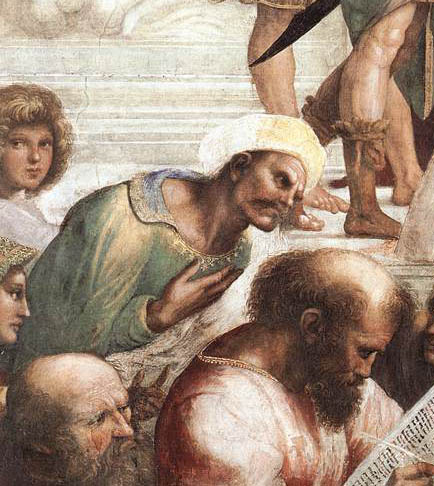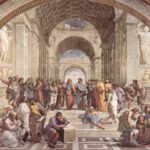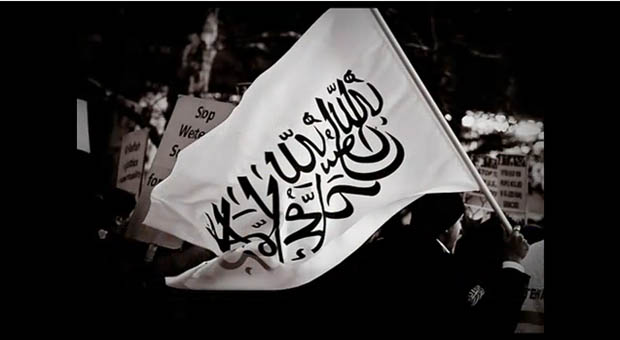
It is perhaps an obvious point to make that the Islamic religious mind in general, through all its various historical phases, doctrinal reflections and affiliations, has a predilection for certainty and automatically accepts established precedent, expelling the process of doubt in all its levels, gradations and methods from its vocabulary, from its literary output, its methodology and culture. In this way the religious mindset continues to maintain firmly its established absolute, doctrinal precedents that are specific to it, preserving them intact from phase to phase or from generation to generation.
IN GENERAL the religious mindset relies on conveying its established, textually confirmed precedent over the generations and over time, counting on its methods of memorisation, oral transmission and the repetition of certainties. We do not find, for example, any differences in the established concepts peculiar to it that the religious mind engaged with, and continues to do so, from its beginnings to the present day. In this respect these concepts are uninfluenced by development, transmission, replacement, or the vicissitudes of times, circumstances and environments, or by human science or changing intellectual and cultural climates.
If we take for example the principle of Shūra (‘consultation’) in the religious mindset from the earliest times until now, we find that as a framework designed to organise relations in political life it has remained unchanged and without development. Nor has it been dispensed with for failing to relate to concepts of contemporary human development in the achievement of modern democracy. There remains nevertheless in the religious mind a preferred ideal and condition of integral life, something which perhaps also needs to be subjected to the gauge of piety according to a religious conception specific to it.
Real life, on the other hand, tells us that many currents of contemporary religious mentality have seen in western democratic procedure a temporary phase, one that is transitional to the application of the religious principle of Shūra at such time as it finds itself able to Islamise laws and constitutions and make public life more religious in the way that it understands it and conceives it. This is notwithstanding the clear difference between Shūra as a defined religious concept, and democracy as a culture, a way of behaviour and a system, given that this last is subjected to objective experimentation in the field. And this in addition to its belief in religious and political pluralism, civic freedoms, the rights of minorities and positive law. More importantly, democracy outlaws from all sides any participation in the culture of violence, as Dr. Shaker al-Nabulsi put it, since it believes in dialogue as a basis for coming together, for building and mutual understanding, for creating solutions and alternatives, and for providing choices. On the other hand, we can see that the culture of violence is a basic cornerstone in the construction of the religious mindset.
The religious mind is at base a cumulative mindset
Over its various consecutive phases the religious mind has continually sanctified the accumulation of certainties and established unequivocal precedents in the guise of the sacred, the infallible and the mythologised. For the religious mind is at base a cumulative mindset, one which draws on the same established precedents and revolves around the textual axes of its past. It consequently does not step beyond the confines of its interpretation of Qur’ānic verses and of the hadith, or of narratives, jurisprudential science and linguistics.
It has become captive to the religious Text, preoccupied by its interpretation, its application and the circulation of these. From these texts the religious mind proceeds to justify its existence and superiority, its eligibility and its permanence, closed off as it is from all that which is human and oblivious to the process of doubt and self questioning. By its very cautious, defensive and adversarial nature it is apprehensive about everything which is new or suddenly emerging or changing. Hence this accumulative nature constantly produces and reproduces ready-made, canned, pre-programmed established responses to questions posed by those from within the school of the religious mindset.
This accumulative nature consequently cannot handle research, examination, self questioning or any level of human doubt which might dismantle, dissect or overturn their conceptions and their cultural, established accumulations.

Suggested Reading
As is well known, when the human mind is free of the domination of absolute certainties when opened up intellectually to all possibilities, when it takes a relative and not an absolute view on facts and issues, it always maintains a predilection for pondering and wondering. It finds in the raising of doubt and in questioning a way to understand matters on a relative, logical, intellectual and philosophical basis. The religious mind, on the other hand, perhaps sees in its certainties a way to reassure the mind in the face of harsh, confusing questions and competing issues and currents of logic and philosophy, and it consequently surrenders to its established precedents.
He who is able to digest the demands of modernity – which the religious mind by its very nature finds very difficult to digest and accept, as Dr. Ahmad al-Baghdadi put it – has emancipated himself from the predominance of textual certitudes, from the dominion of absolute precedents and from the dominance of the legacies of the past. In so doing he makes great strides towards achieving the benefits of civilisation and enjoying its cultural and intellectual achievements. He can move on without turning back, or digging in and stagnating in the arenas of the past or in established templates.
The religious mind sees in its certainties a way to reassure the mind in the face of harsh, confusing questions
We should therefore try to grasp why the religious mindset wars against renewal, modernity, freedoms, openness and religious and intellectual pluralism – for this mindset is incapable of accepting and accommodating its standards, living with them or interacting with them, and instead can only choke itself in stirring up the dust and reproducing its inherited textual past. The religious mind must needs be involved in the collective religious mindset which is constantly founded upon an environment that fosters established precedent. At is automatically enlisted into its interpretations and must adhere to its rulings and beliefs. Basically, the religious mind and the religious collective mindset contribute to their mutual construction since their nature and structure, their composition and inclinations are things which are held in common, governed by them and taking them as points of reference. It secures their combined legitimacy, identity and existence within the total, the collective and the ideologically totalitarian.
The religious mindset therefore cannot enjoy a sense of the individual self and does not possess independent intellectual individuality. It cannot create through any independence of internal sense or sound and it does not possess in its vocabulary any conception of departing from the logic of the collective and the collective mind. Instead it always sees itself as the mirror image of the total and collective mindset.
The relationship between them is one of deep-rooted, close reciprocity, one which is always governed by a self-containment, embodied in social and regulatory circles which are nurtured by the same certainty and participating cultural factors. Both continue to fight doggedly so that the relationship between them remains based on the same framework of authority and certitude, and continues to defend their inherited established precedents from doubt, erosion, schism or convulsions. They attempt continually to distance themselves from anything that would lead them into doubt and self questioning, for fear that these would alienate them from the level of certitude they have both attained.
This is a self-contained relationship that obtains between them and one which by its very nature militates against doubt, suppresses independence and obliterates questioning. It is highly wary of the waves of change, and of transformation and development.
Since the religious mind lies under the domination of its textual past and is preoccupied with it and reproduces it constantly, we find it ring-fencing knowledge within the confines of the religious Text and seeing the inherited religious Texts as constituting the basis of all knowledge and the ‘head of all wisdom’. For the religious mind cannot digest philosophical and humanistic knowledge if these are not consistent with what the religious Text says, and it therefore makes every attempt to find a religious interpretation for them or paint them with a religious, textual hue.
The religious mind cannot digest philosophical and humanistic knowledge if these are not consistent with what the religious Text says
Even when Ibn Rushd attempted to create from his viewpoint a reconciliation between faith and philosophy on a scientific and rational basis, all doors and windows were shut off to him and his attempts were aborted when they fell back into the self-isolation of their absolute certainties.
And it is no secret that Ibn Sīnā murmured his despair and tedium at the impossibility of the religious mind and the philosophical mind coming into concord with each other after he found in the human philosophical sciences a broad and welcoming space capable of accommodating questioning, reflection, doubt, criticism and change, while the religious mind continually was attempting to confine knowledge as far as it could within the bounds of what the religious Text allowed. We can, moreover, understand how societies that are open and capable of ingesting the values of modernity have reached the point where they are today, and what it is that they aspire to and seek for their tomorrows. This after having fought long and hard in the cultural, intellectual and philosophical fields to gain intellectual, critical and philosophical freedom from the domination of established precedent, guided by the inspired insights and intellectual and philosophical efforts of Descartes, Kant, Voltaire, Spinoza and others.
The religious mind is still drowning in its soporific certainties that once were in step with its religious legal priorities and political aspirations. All of its efforts, aims and purposes in life have become focused around them and these certainties have become transformed into rigid mental conceptions in the make-up of the religious mind. One of these conceptions is that associated with establishing the state – the Islamic caliphate – which is destined to rule the world.

Suggested Reading
The following question might be posed to one of this mindset: do you wish that people in Europe and the (infidel) West should become Muslims and the banners of the Islamic Caliphate flutter in their boundaries?
If this is posed, for example, to anyone who might be classified as belonging to the religious mindset frame that believes in these certainties (as I have frequently done when coming across them during my brief sojourn in Sweden), one will find that the automatic answer is: “Yes and without any doubt or hesitation.” Accordingly, there are also those who believe with total and emotional certainty in another soporific religious concept – the ‘Noble State’ – that is to accompany the re-appearance of the Hidden Imam, irrespective of whether they live in Europe and the West and enjoy a secure and dignified life that respects their humanity, their honour and their choices, and enjoy their religious freedom too. All these soporific certainties and arbitrary concepts will only endure in the religious mindset and maintain their mastery over it if there is no attempt made to subject it to doubt, questioning, criticism and rational thinking.
Main image: Ibn Rushd depicted in Raphael’s fresco The School of Athens, 1510. bn Rushd’s reconciliation between faith and philosophy was rejected by Muslims


